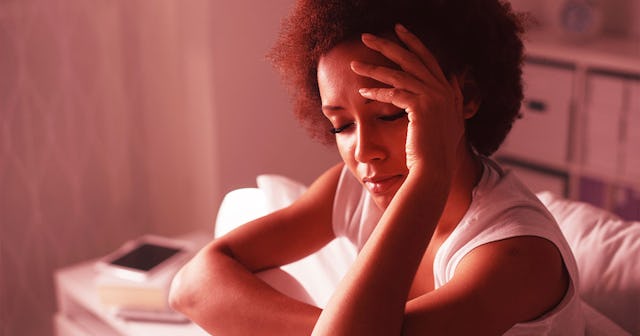When Insomnia Is Your Worst Nightmare

I don’t remember exactly when sleep began to elude me. I used to be a night-owl, and when my first daughter was born, you could make the argument I became more of an early bird. A few years later with my second daughter’s arrival, I officially became what you might call a permanently exhausted pigeon (aka someone who suffers from chronic insomnia).
All jokes aside, what started as restless nights here and there turned into a struggle to fall asleep and stay asleep through the night. The small people are now 9 and 6 1/2 years old, so I can’t even blame them. That said, this isn’t an uncommon struggle.
According to the American Academy of Sleep Medicine, 10% of people suffer from chronic insomnia. They aren’t talking about people who have a few symptoms here and there, which account for 30-35% of people. They also aren’t talking about people who only experience trouble sleeping for a short period (15-20%). No, honey. They’re talking about the one in ten people who can’t fall asleep, stay asleep, or outrun feelings of perpetual exhaustion.
The good news is there are several ways to combat your insomnia without medication (as well as with). But because I’m not a doctor, we’re going to focus on five ways to change up with your bedtime routine to help you get some much-needed quality Z’s.
A Grown-Up Bedtime Routine
We all know the importance of a solid bedtime routine for your little people, but do you make time to calm your mind and body before hitting the sheets? Instead of promptly collapsing into bed after you’ve loaded the dishwasher, folded the laundry, and tucked your minions into bed, engage in other activities that support self-care and relaxation. For example, when all is said and done, I’ll take a warm shower, brew myself a cup of tea, and fall back into 19th-century Russian court in my favorite novel.
Sleepy-Time Tea
What can’t tea do? Tea as medicine. Tea as a caffeine boost. Tea as gossip. And yes, tea as a sleep-aid. Part of my bedtime routine is a warm cup of tea (especially in the cold AF Wisconsin winters). Brew your own if you’re into that, or if you aren’t, there are many different options out there premade. All you have to do is add hot water.
Depending on your usual consumption of, or sensitivity to caffeine, insomnia symptoms could be exacerbated by caffeine before bed. When you’re shopping around for a new brew make sure it’s caffeine-free. Chamomile, lavender, and lemon are frequently featured in many different sleepy-time teas but don’t worry if these flavors aren’t quite your jam. You can always add a little bit of honey to sweeten.
Avoid Those Screens
We’re all guilty of it. You settle into bed and check your email one more time or catch up on messages you missed earlier in the day. Don’t do it! Or, if you must, make sure you’ve changed the settings on your tech to dark mode, so you aren’t being blinded by the brightness of your screen. Also, consider investing in blue light glasses (I found mine at Target for $5). Research has found that the blue light glaring at us from our screens works against us as it suppresses melatonin. And in case you didn’t know, the more melatonin our bodies make, the sleepier we get.
Melatonin Gummies
Speaking of which — I don’t know why I hesitated for such a long time before adding melatonin gummies to my bedtime routine. I guess I wanted to think I was superwoman and could conquer my insomnia all by myself, thank you very much. Alas, adding melatonin to the routine was game-changing. Insomnia is a b*tch, that not only impacts your quality of sleep but your ability to fall asleep. If you find you need a little extra support with the latter, an extra dose of melatonin might be the answer to your problem.
Don’t Fight It
Some nights, nothing helps. I toss and turn, and stare at a pitch-black ceiling wishing that counting sheep actually worked like those mattress commercials promised me they would. Forcing yourself to try to fall asleep when you aren’t ready is just as futile as convincing your child that ice cream is not the best food group in the world.
If your body, or your mind, isn’t as tired as it needs to be, fighting against this will result in poor sleep. Just because you’ve managed to keep your eyes closed doesn’t mean your body is getting the rest it needs to function. Take the time to get up and journal, read, or engage in something that you find relaxing to calm your mind and body.
There are few things more frustrating than the inability to fall asleep. While practicing a regular bedtime routine will help promote better sleep, sometimes it just isn’t enough. In my case, seeking treatment for underlying mental health illnesses (anxiety and depression) did improve my chronic insomnia. Through trial and error, my provider and I did decide on a sleep-aid I can take when I’m having one of those nights.
Regardless of how you go about it, having a quality night’s sleep is essential to having a good life. No, I’m not talking about getting a few more minutes of beauty rest. I’m talking about solid, sound, full nights of sleep that support your brain functioning and a healthy body.
If you struggle with insomnia or think you might be, don’t hesitate to reach out to your provider to formulate a plan to help you get good quality sleep. Because, honestly, life is waaay too short to walk around like a permanently exhausted pigeon.